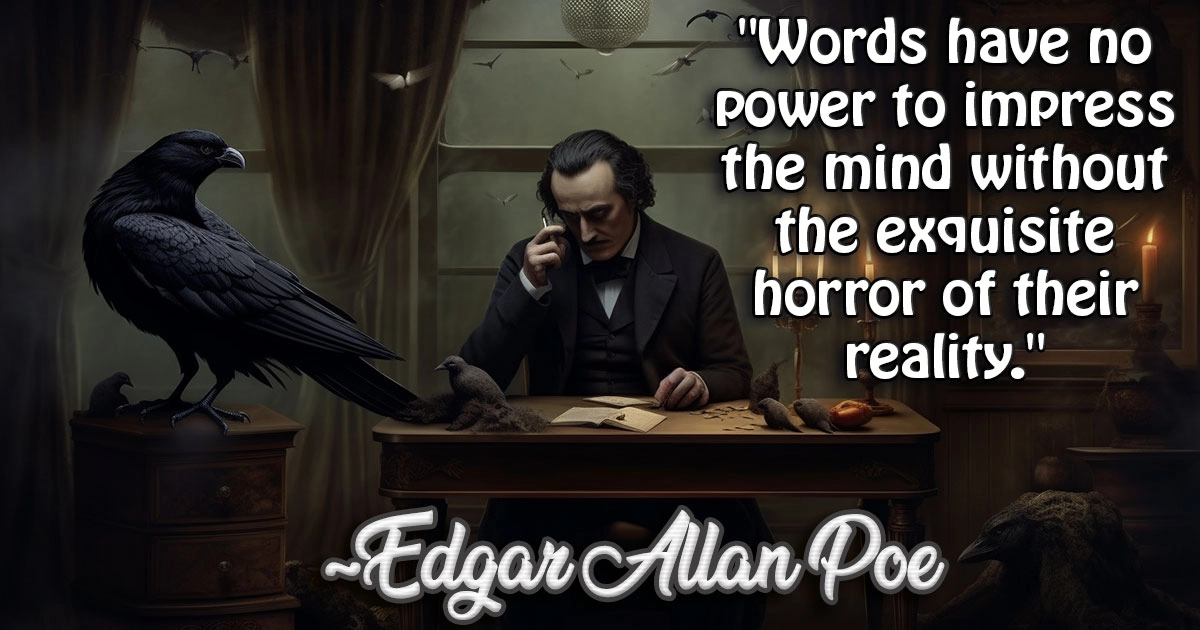Edgar Allan Poe: The Tragic Life that Shaped American Literature

Edgar Allan Poe
Edgar Allan Poe's life, marked by personal tragedy and literary brilliance, profoundly shaped American literature. His works, exploring dark themes, continue to captivate readers.

Early Life and Tragic Beginnings
Edgar Allan Poe was born in Boston on January 19, 1809, to traveling actors. His early life was marked by tragedy. His father abandoned the family, and his mother died of tuberculosis when he was just two years old. Orphaned, Poe was taken in by John and Frances Allan, a wealthy couple from Richmond, Virginia. Though never formally adopted, Poe took their name as his own, thus beginning the troubled relationship that would define much of his life.
As a child, Poe exhibited a remarkable talent for storytelling and poetry. His intellect was nurtured by the Allans, and he received a classical education that would serve as the foundation for his literary career. However, his relationship with John Allan was strained and tumultuous. Allan was a successful tobacco merchant and expected Poe to follow in his footsteps. Poe, however, was drawn to the arts and literature, leading to frequent clashes between the two.

Poe’s Academic Struggles and Military Life
At the age of 17, Poe entered the University of Virginia. He excelled academically but struggled with the rigid structure and strict rules. It was here that Poe’s lifelong battle with financial instability and debt began. Unable to afford the tuition and costs associated with university life, he turned to gambling, which only exacerbated his financial woes. His relationship with John Allan deteriorated further, and after a year, Poe left the university and returned to Richmond, only to find that his fiancée, Elmira Royster, had become engaged to another man.
Disheartened and desperate, Poe enlisted in the United States Army under an assumed name, Edgar A. Perry. He excelled in his duties and attained the rank of sergeant major. However, the discipline and structure of military life did not suit him, and he sought release from his five-year enlistment. With the help of his foster father, Poe secured an early discharge and entered West Point, the United States Military Academy. His time at West Point was brief and troubled, culminating in a court-martial for gross neglect of duty.
Rise to Literary Fame
After leaving West Point, Poe turned his attention fully to writing. He moved to Baltimore to live with his aunt, Maria Clemm, and her daughter, Virginia. It was during this period that Poe began to establish himself as a writer. His first book, a collection of poems titled "Tamerlane and Other Poems," was published anonymously in 1827. Though it received little attention, it marked the beginning of his literary career.
Poe's fortunes improved slightly when he won a literary contest with his short story "MS. Found in a Bottle" in 1833. This victory brought him to the attention of John P. Kennedy, a wealthy Baltimorean who helped Poe secure a position as an editor at the Southern Literary Messenger in Richmond. Poe's work as an editor and critic was highly regarded, but his intemperate behavior and clashes with the magazine's owner led to his dismissal.
In 1836, Poe married his cousin, Virginia Clemm, who was only 13 years old at the time. The marriage was both a source of great happiness and profound sorrow for Poe. Virginia was frail and suffered from tuberculosis, the disease that had claimed his mother. Despite their struggles, Poe and Virginia shared a deep bond, and her illness and eventual death would profoundly impact his writing.
The years that followed were marked by both professional success and personal tragedy. Poe's short stories and poems began to gain recognition. "The Fall of the House of Usher," "The Tell-Tale Heart," and "The Murders in the Rue Morgue" showcased his talent for macabre and gothic storytelling. His poem "The Raven," published in 1845, brought him widespread fame and is considered one of his greatest works.
Personal Struggles and Final Years
However, Poe's financial situation remained precarious. He struggled with poverty and relied on his writing and editing work to make ends meet. His relationship with John Allan, who had remarried and started a new family, remained strained, and he received little financial support from his foster father.
Tragedy struck again in 1847 when Virginia succumbed to tuberculosis. Her death devastated Poe, and his health and mental state deteriorated rapidly. He moved frequently, staying with friends and acquaintances, and continued to write, though his work became increasingly erratic and dark.
In the final years of his life, Poe's behavior became more erratic, and he struggled with bouts of depression and alcoholism. He attempted to court several women, including the poet Sarah Helen Whitman, but his erratic behavior and drinking sabotaged his efforts. In 1849, he rekindled his relationship with his first love, Elmira Royster, who was now a widow. They became engaged, and Poe appeared to be on the verge of a new beginning.
However, fate had other plans. On September 27, 1849, Poe left Richmond for New York, but he never made it to his destination. He was found delirious and in distress on the streets of Baltimore on October 3. He was taken to Washington College Hospital, where he remained in a state of delirium for several days. He died on October 7, 1849, at the age of 40. The exact cause of his death remains a mystery, with theories ranging from alcohol poisoning to rabies.
Poe’s Lasting Influence
Edgar Allan Poe's life was marked by profound tragedy, personal demons, and financial struggles. Yet, despite these hardships, he produced a body of work that has left an indelible mark on American literature. His tales of the macabre, his exploration of the human psyche, and his mastery of the short story and poetic form have earned him a place among the great literary figures of the 19th century.
Poe's influence extends beyond literature. He is credited with inventing the modern detective story and influencing the development of science fiction. His exploration of themes such as death, madness, and the supernatural continues to captivate readers and inspire writers, filmmakers, and artists.
Poe's legacy is a testament to the power of the human spirit to create and endure despite adversity. His works, filled with dark beauty and profound insight, remain a testament to his genius and a source of inspiration for generations of readers. In the end, Edgar Allan Poe's life and work remind us that even in the darkest moments, the light of creativity and imagination can shine through.


